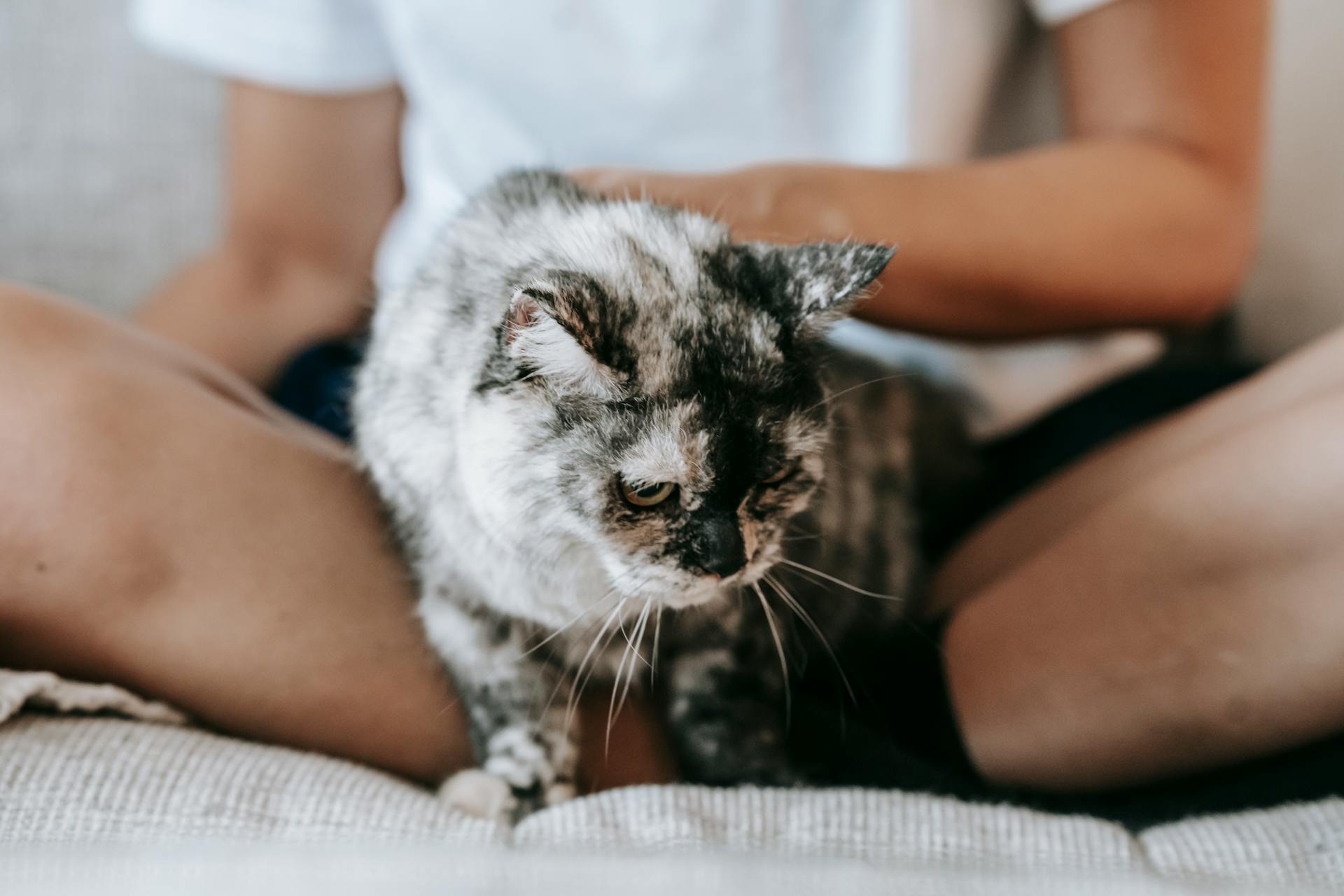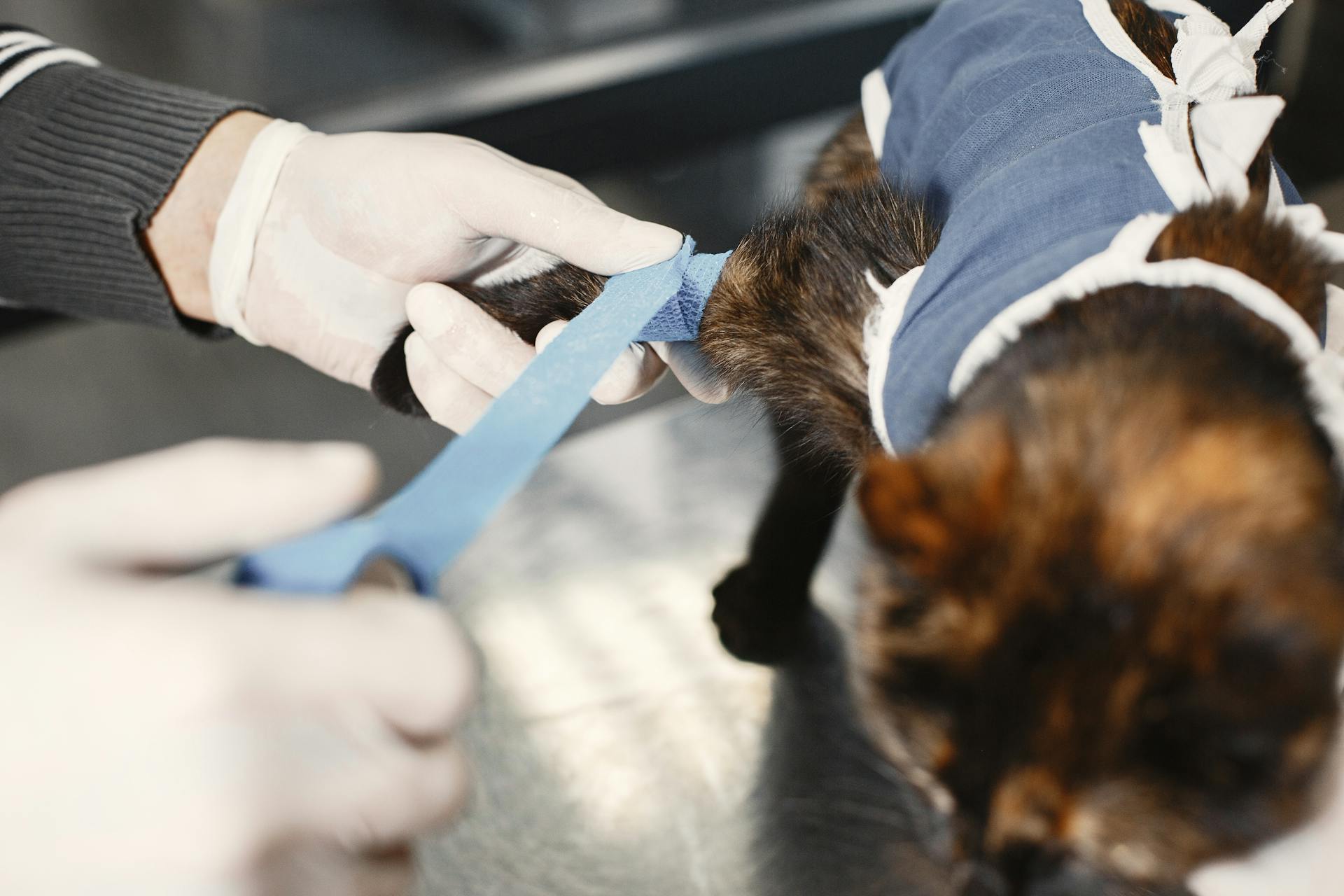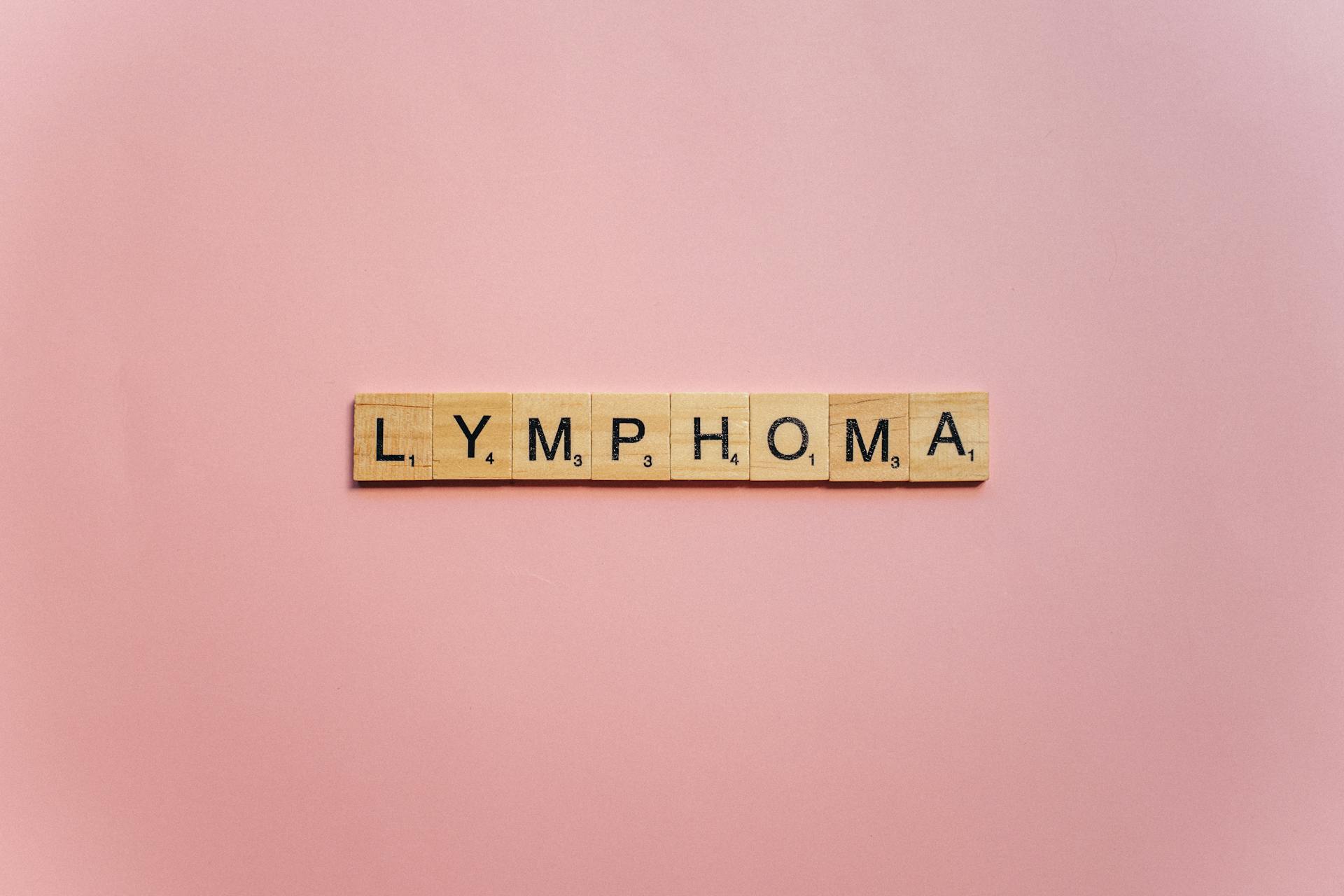
Feline lymphoma life expectancy can vary depending on the type and stage of the disease.
Early detection is key, as it can significantly improve a cat's chances of survival.
The average life expectancy for cats with lymphoma is around 5-6 months with treatment.
However, some cats can live up to a year or more with proper care and management.
Diagnosis and Treatment
Diagnosis and treatment of feline lymphoma can be a complex process, but understanding the basics can help you make informed decisions for your cat's care.
A full medical evaluation is required to make a lymphoma diagnosis, which can be tricky since clinical signs like weight loss, poor appetite, and vomiting/diarrhea are common to many illnesses.
Biopsies are frequently used to diagnose lymphoma in cats, and high-tech testing like flow cytometry or DNA analysis may be required to confirm a lymphoma diagnosis.
Chemotherapy is a common treatment for feline lymphoma, and side effects are often lower than owners anticipate. In fact, surveys have shown that 85% of cat owners who chose to treat their cat's lymphoma were completely satisfied with their decision.
You might like: Canine Lymphoma Holistic Treatment
Treatment for lymphoma in cats varies depending on the type of lymphoma, with small cell lymphoma typically managed with steroids and chlorambucil, and large cell lymphoma treated with surgery, chemotherapy, and sometimes radiation.
Here are some common chemotherapy protocols for feline lymphoma:
Pet Owners: Diagnosis Essentials
Diagnosing feline lymphoma can be a complex process, but it's essential to understand the steps involved. Your veterinarian will first perform a physical examination to assess your cat's overall health.
A thorough medical evaluation is required to make a lymphoma diagnosis. Clinical signs such as weight loss, poor appetite, and vomiting or diarrhea are common, but can also be symptoms of other illnesses like inflammatory bowel disease, pancreatitis, or diabetes.
Your veterinarian will likely perform laboratory work, including a chemistry panel, complete blood count, and urinalysis, to assess your cat's overall health. Vitamin B12 levels are often low in cats with gastrointestinal disease.
Abdominal ultrasound is a non-invasive test that can help identify distinct masses or changes in the intestinal wall layering. However, it's not a definitive test for lymphoma and may not be able to differentiate between SCL/LCL and IBD without further testing.
Fine needle aspiration and cytology can provide information about the type of cells present within a tumor, but it may not be able to provide a definitive diagnosis, especially in cases of SCL.
Biopsy is a more invasive procedure that involves removing a sample of tissue for testing. It can provide information on the grade of lymphoma, which is essential for determining the best course of treatment.
Here are the types of biopsies that may be performed:
- Endoscopic biopsy: A small camera is passed into the intestines to collect tissue samples. However, these samples may not be full thickness, and the entire intestinal tract may not be assessed.
- Surgical biopsy: A surgeon opens the abdomen to collect samples from multiple sites. This type of biopsy provides full thickness samples and allows the surgeon to visualize the entire GI system.
Diagnosis and Treatment
Diagnosing lymphoma in cats typically involves a combination of physical examination, laboratory tests, and imaging studies.
The treatment for lymphoma in cats varies depending on the type of lymphoma. For small cell lymphoma, cats are often managed with a combination of prednisolone and chlorambucil.
Cats with small cell lymphoma may also receive vitamin B12 supplements, which can be given either orally or through injectable weekly doses for six weeks, followed by monthly injections.
Suggestion: T Cell Lymphoma Dogs

Probiotics are recommended to help restore a cat's gastrointestinal flora, and dietary changes may also be suggested by a veterinarian.
For cats with large cell lymphoma, treatment typically involves surgery, chemotherapy, and sometimes radiation.
The most common chemotherapy treatment for large cell lymphoma is a combination of cyclophosphamide, doxorubicin, vincristine, and prednisolone, known as CHOP.
This treatment involves weekly chemotherapy injections and daily oral prednisolone administration.
There are three basic options for chemotherapy of feline lymphoma, including treatment with steroids, a single chemotherapy drug, or a combination of multiple chemotherapy drugs in a rotational schedule.
Treatment with steroids, such as prednisone and prednisolone, can be effective in killing cancer cells, but is not considered traditional chemotherapy.
A single chemotherapy drug, such as chlorambucil, may be used to treat intestinal small cell lymphoma.
This can help keep a cat in remission for months, often in combination with steroids.
For your interest: Small Cell Lymphoma in Dogs
Symptoms and Signs
Feline lymphoma can be a sneaky disease, and its symptoms can be quite non-specific.

Weight loss is a common symptom, often accompanied by a decrease in appetite.
Lymph nodes, particularly in the neck, armpits, and groin, may become swollen and painful to the touch.
Increased urination and thirst are also signs of feline lymphoma, often due to kidney involvement.
Coughing, difficulty breathing, and a swollen abdomen can indicate more advanced stages of the disease.
Feline lymphoma can also cause anemia, leading to pale gums and fatigue.
In some cases, cats may exhibit vomiting, diarrhea, or lethargy due to secondary infections or organ damage.
See what others are reading: Feline Ibd vs Lymphoma
Life Expectancy and Care
The prognosis for feline lymphoma varies greatly depending on the type of lymphoma. Small cell lymphoma (SCL) has a relatively good prognosis, with 70% of cats achieving remission.
Remission in cats with SCL can be managed for some time with medications, B12 supplementation, dietary modification, and probiotics. This can lead to a median survival time of 23-30 months.
Unfortunately, large cell lymphoma (LCL) has a much lower prognosis, with only 50-70% of cats achieving remission with aggressive treatment.
Cat Lifespan
Your cat's lifespan can vary greatly depending on the type of lymphoma they have. Cats treated for small cell intestinal lymphoma often live 2-3 years.
For cats with more aggressive forms of lymphoma, like large cell lymphoma, survival time is much shorter, even with multi-agent chemotherapy. Some cats with this type of lymphoma may only survive months.
Healthcare Plan
Creating a healthcare plan for your cat with lymphoma is crucial for their well-being. Your veterinarian will work with you to determine the best course of treatment based on the type of lymphoma and your cat's overall health.
Small cell lymphoma (SCL) can be managed with medications, B12 supplementation, dietary modification, and probiotics. This approach can lead to remission in 70% of cats, with a median survival time of 23-30 months.
Aggressive chemotherapy, surgery, and radiation may be necessary for large cell lymphoma (LCL), but the prognosis is lower, with only 50-70% of cats achieving remission. This approach can still improve your cat's quality of life, even if the survival time is shorter, ranging from 2-9 months.
Prednisolone (steroid) therapy alone may be used if chemotherapy or surgery is not an option, but this approach is less effective. Your veterinarian will help you weigh the pros and cons of each treatment option and create a personalized plan for your cat's care.
Expand your knowledge: Canine Lymphoma Survival Rate
Understanding the Disease

Feline lymphoma is a type of cancer that affects a cat's immune system, causing abnormal growths in the lymph nodes, spleen, liver, and other organs.
These growths can be benign or malignant, and their impact on a cat's life expectancy varies depending on the stage and type of lymphoma.
Lymphoma is the most common type of cancer in cats, accounting for about 1 in 5 cancer diagnoses.
On a similar theme: Canine Mouth Cancer Life Expectancy
Possible Causes
Lymphoma is a complex disease, and understanding its possible causes can help us better grasp its nature. Lymphoma is the uncontrolled proliferation of lymphocytes.
Cats infected with FeLV, the Feline leukemia virus, are 60 times more likely to develop lymphoma. This virus can lead to a rapid increase in lymphocyte proliferation.
Exposure to tobacco smoke, radon, and agricultural chemicals may also increase the risk of developing lymphoma. These environmental factors have been linked to an increased probability of the disease.
Cats infected with FIV, the Feline Immunodeficiency Virus, are 5 to 6 times more likely to develop lymphoma. FIV's immunosuppressive effects can weaken a cat's immune system, making it more susceptible to lymphoma.
Additional reading: Can Dogs Develop Allergies Later in Life

Immune dysfunction and genetic factors, such as breed predisposition, also play a role in the development of lymphoma. These factors can contribute to an increased risk of the disease.
Here are some potential contributing factors of lymphoma:
- FeLV: Feline leukemia virus can lead to proliferation of lymphocytes.
- FIV: Feline Immunodeficiency Virus increases the risk of development due to its immunosuppressive effects.
- Environmental factors: tobacco smoke, radon, and agricultural chemicals may increase the probability of developing lymphoma.
- Immunologic factors: immune dysfunction
- Genetic factors: breed predisposition
Is Cancer Common?
Cancer is a serious and complex disease that affects many animals, including our feline friends. Lymphoma is the most common form of malignant cancer in cats.
Cats with FeLV or FIV are more prone to developing lymphoma, making it a significant concern for cat owners.
Lymphoma can have a significant impact on a cat's quality of life, and early detection is crucial for effective treatment.
Explore further: Canine Bone Cancer Life Expectancy
Risk Factors
Cats over ten years of age are more susceptible to lymphoma. This is a common malignant cancer that affects felines of this age group.
FeLV and FIV can significantly increase a cat's risk of developing lymphoma. Cats infected with FeLV are 60 times more likely to develop lymphoma, while those infected with FIV are 5 to 6 times more likely.
Intact, outdoor, male cats have a slightly higher risk of developing lymphoma due to their increased risk of contracting FIV and FeLV from fighting behaviors.
The risk of lymphoma is not limited to any specific sex, as both male and female cats are subject to this risk.
Siamese cats and related breeds seem to be more prone to lymphoma.
Readers also liked: Puggle Age Expectancy
MeSH Terms
Understanding the Disease requires a clear understanding of the terminology used to describe it. MeSH terms provide a standardized way of categorizing and describing diseases.
MeSH stands for Medical Subject Headings, and it's a system used to classify and index medical literature.
The MeSH terms for this disease include "Lymphoma / veterinary" and "Lymphoma / drug therapy".
These terms indicate that the disease is a type of lymphoma that affects animals and that treatment involves medication.
The MeSH terms also include "Female" and "Male", indicating that the disease affects both males and females.
Here is a list of some of the key MeSH terms for this disease:
- Lymphoma / veterinary
- Lymphoma / drug therapy
- Female
- Male
- Remission Induction
- Survival Analysis
- Time Factors
- Treatment Outcome
These terms will be useful in understanding the disease and its treatment.
Types of Cancer
Cancer in cats can be a complex and multifaceted disease, and understanding its various types is crucial for effective treatment and management.
Gastrointestinal lymphoma is the most common type of lymphoma in cats, and it can cause a range of symptoms including weight loss, vomiting, diarrhea, and appetite changes.
There are two main types of GI lymphoma: small cell lymphoma (SCL) and large cell lymphoma (LCL). SCL is also known as lymphocytic or low-grade lymphoma, while LCL is also known as lymphoblastic or high-grade lymphoma.
Cats are more likely to develop GI lymphoma as they age, with the majority of cases occurring in cats between 9-13 years old.
Gastrointestinal lymphoma can develop in any organ, but it most commonly affects the lymph nodes, chest cavity, kidneys, liver, spleen, central nervous system, eyes, skin, nose, or blood.
Owner's Guide
As a cat owner, it's essential to understand the life expectancy of your feline friend if they're diagnosed with lymphoma. The life expectancy of a cat with lymphoma can vary greatly, but on average, it's around 1-3 months with supportive care.
Cats with lymphoma often experience weight loss, lethargy, and loss of appetite. These symptoms can be challenging to manage, but with the right treatment and care, your cat can still enjoy a good quality of life.
The type of lymphoma your cat has can significantly impact their life expectancy. For example, cats with mediastinal lymphoma tend to have a poorer prognosis than those with alimentary lymphoma.
Your veterinarian will work with you to determine the best course of treatment for your cat's lymphoma. This may include chemotherapy, radiation therapy, or a combination of both. The goal is to manage your cat's symptoms and improve their quality of life.
Cats with lymphoma often require regular veterinary check-ups to monitor their condition and adjust their treatment plan as needed. This can help you and your veterinarian make informed decisions about your cat's care.
On a similar theme: Cost to Treat Lymphoma in Dogs
Frequently Asked Questions
Is it worth treating a cat with lymphoma?
Treating a cat with lymphoma can be a viable option, with a high success rate of 90-95% achieving remission for 2 years or more. If you're considering treatment, it's worth exploring the details of this option to see if it's right for your cat.
Sources
- https://avmajournals.avma.org/abstract/journals/javma/227/7/javma.2005.227.1118.xml
- https://vetster.com/en/conditions/cat/lymphoma-in-cats
- https://pubmed.ncbi.nlm.nih.gov/16220673/
- https://www.smalldoorvet.com/learning-center/medical/lymphoma-in-cats/
- https://www.amcny.org/blog/2023/06/21/feline-lymphoma/
Featured Images: pexels.com


